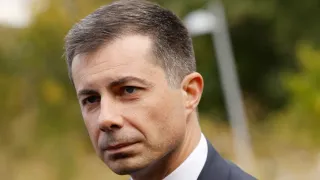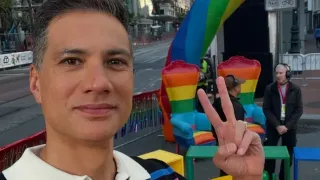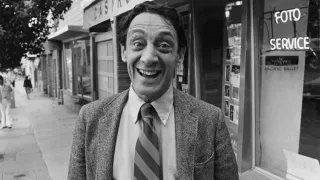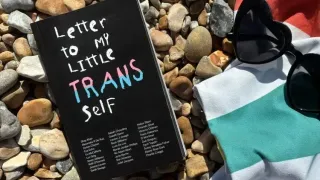December 18, 2014
LGBTQs Join Allies in Police Protests
Kilian Melloy READ TIME: 6 MIN.
From the queer Oakland woman who helped start the widely used Black Lives Matter slogan to the gay police chief who stood with Richmond protesters to the effigies of lynching victims that were hung at UC Berkeley, LGBTQ people have claimed a place in the protests that have recently swept local cities and the rest of the country.
The protests have centered around police brutality, especially the killings earlier this year of two unarmed black men in Ferguson, Missouri and Staten Island, New York and the failure by grand juries in those cities to indict the white police officers who killed them.
Alicia Garza, who identifies as queer, is one of the people who started the Black Lives Matter slogan after a jury in 2013 acquitted George Zimmerman, the man accused of killing unarmed black Florida teen Trayvon Martin in 2012.
In recent weeks, the #BlackLivesMatter hashtag has frequently been seen on protest signs everywhere and on social media.
"I think in the places where the slogan has been used appropriately, it's been incredible," Garza, 33, of Oakland, said of the phrase, which has also become an online forum. "In the places where it's been used but where it doesn't actually live up to the challenge that Black Lives Matter has issued, it's challenging for us, and a little bit problematic."
She said those challenges have come up when there's been "a really narrow vision of who black people are."
"Black Lives Matter really has aimed to ensure that we're lifting up all black lives," she said. "Black Lives Matter is not just about black men." She said it also includes transgender black people, women, poor, disabled, and others who have been "impacted directly by state violence and police violence."
Some protest tactics have drawn the ire of police, but Garza defended a couple of the actions. She was part of the team that shut down the West Oakland BART station November 28, and she also attended the shut down of Oakland Police headquarters, 455 Seventh Street, Monday morning.
Officer Johnna Watson, an Oakland police spokeswoman, said in a news release Monday that shortly after 7:30 a.m. "multiple groups of protesters" blocked the building's main entrances "by chaining shut four of the building's doors, and then chaining themselves to the doors."
Watson said three of the doors serve as the primary entrances and exits, and as a result of the blockages, "the public could not access important police services, such as reporting crimes, obtaining public records, accessing necessary paperwork for vehicle impound releases, and property releases." The chains were eventually cleared and the protesters left. About 150 to 200 people were in the crowd, she said.
In her email early Monday afternoon, Watson said 25 arrests had been made for violations including obstructing or blocking a public building and obstructing or delaying a police officer. She said police had been "in communication with identified group leaders and worked toward a peaceful resolution."
Asked about what the shut down accomplished, Garza said, "Throughout the history of this country direct action and shutdowns and protest have changed the landscape of our country."
She added, "Really, the question is not 'What does this accomplish?' ... What we're trying to talk about here is what is the crisis the black communities are facing, and what do we need to do as a country to eliminate that crisis?"
She indicated the Oakland police response to the shut down was disproportionate, an example of how public resources are misused.
"A temporary inconvenience of having the police doors locked for four hours is nothing compared to the millions and millions of dollars" that have been paid out to the families of victims of police violence, Garza said.
The four-hour period is how long Michael Brown's body was in the street after he was shot and killed by Ferguson police Officer Darren Wilson in August. Wilson has since left the department.
Richmond Chief Stands with Protesters
Garza did have praise for some police action, however.
Gay Richmond Police Chief Chris Magnus garnered attention last Tuesday, December 9 when he and others from his department stood with protesters. Magnus held a sign that said, "Black Lives Matter."
Police in Richmond have "done some incredible work," Garza said, and the department "has a lot to show" other police agencies in terms of addressing problems like racism and a lack of transparency.
Richmond City Councilwoman Jovanka Beckles, a black Latina lesbian and the city's vice mayor, called Magnus' participation "a beautiful image of our city."
Beckles, who also was at last Tuesday's protest, said, "Our police department actually respects our community," and called the police officials' act "a perfect example of community policing, not military policing."
"I really do believe that black and brown lives matter," she said, adding that she took part because "I wanted to show solidarity with the community, particularly the young people who organized this."
The city "values their lives," she said, but "it's a scary time that they're living in."
Beckles said, "in most cases," outside Richmond, police "can get away with killing you, and say that you were resisting arrest."
The San Francisco Chronicle and other media outlets have reported that the Richmond Police Officers Association has criticized Magnus for wearing his uniform during the protest, and that political activities in uniform are prohibited. Magnus, who didn't respond to interview requests for this story, has told reporters that he didn't think what he did was political. The union couldn't be reached for comment.
Some protests, particularly in Oakland and Berkeley, have turned violent, including businesses being vandalized.
Beckles said the vandalism "really saddens me." She also pointed to one instance in which protesters reportedly attacked a man after he tried to put out a garbage fire.
"They are not a part of this movement," Beckles said. "They are opportunists. They are thugs."
Kimberly Aceves, 43, is the executive director of Richmond's RYSE Center, the group that organized last Tuesday's protest.
Aceves said, "As a queer Latina," she believes that "the liberation of black people is the liberation of my people, and I definitely feel like this issue cuts to the core of how racism in this country has played out, and even how homophobia has played out."
She spoke of a couple of the aspects of recent protests that have been troubling to some people.
"Do I feel good about local business people having their windows broken in? No, that's not something I necessarily believe in, but the rage felt by so many black people in this country is justified," Aceves said.
Sister Roma of the Sisters of Perpetual Indulgence, left, was just one of hundreds of people who took part in last weekend's Union Square protest. Photo: Steven Underhill
In San Francisco last Saturday, Sister Roma, a member of the Sisters of Perpetual Indulgence, was one of many people who took part in protests.
In a Facebook message, Roma, 51, whose given name is Michael Williams, said, "I was there because I believe that black lives matter. All lives matter. ... I feel it's important as a gay man to support the black community because my community has been and continues to be persecuted in the same way."
Roma added, "I'm proud that so many people turned out for the march, and I'm glad it was peaceful. I don't support looting or violence, but when you're fighting for your life, you fight."
Effigies in Berkeley
In another highlight of the tension that has arisen over race in recent weeks, the news site Berkeleyside reported last weekend that cardboard effigies of lynching victims were found hanging at UC Berkeley Saturday. Photos showed the figures bearing the slogan, "I can't breathe," a reference to the last words of Eric Garner, the New York man who died after being placed in a chokehold by a police officer.
The news site reported that a flier from "a Bay Area collective of queer black and [people of color] artists" was posted on the campus.
"These images connect past events to present ones - referencing endemic faultlines of hatred and persecution that are and should be deeply unsettling to the American consciousness" the flier said. "... For those who think these images are no longer relevant to the social framework in which black Americans exist everyday - we respectfully disagree."
UC Berkeley police spokespeople didn't respond to requests for comment about the effigies.
Beckles' Plans
This week, Beckles planned to introduce a resolution supporting the U.S. Justice Department's civil rights investigation into the police killing of Brown. A grand jury announced late last month that it had decided not to indict Wilson, the officer who killed him.
Beckles is also organizing "a brainstorming forum around police brutality in the nation," which will start at 6 p.m. Friday, December 19 at the Richmond Museum of History, 400 Nevin Avenue.






